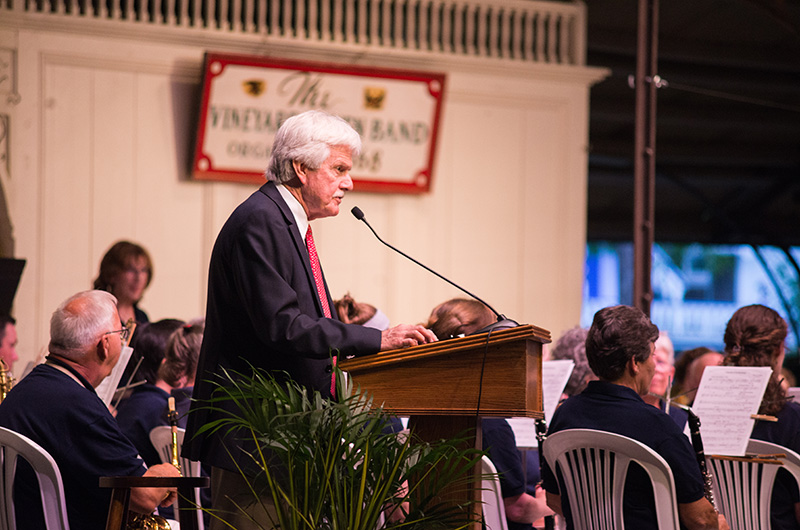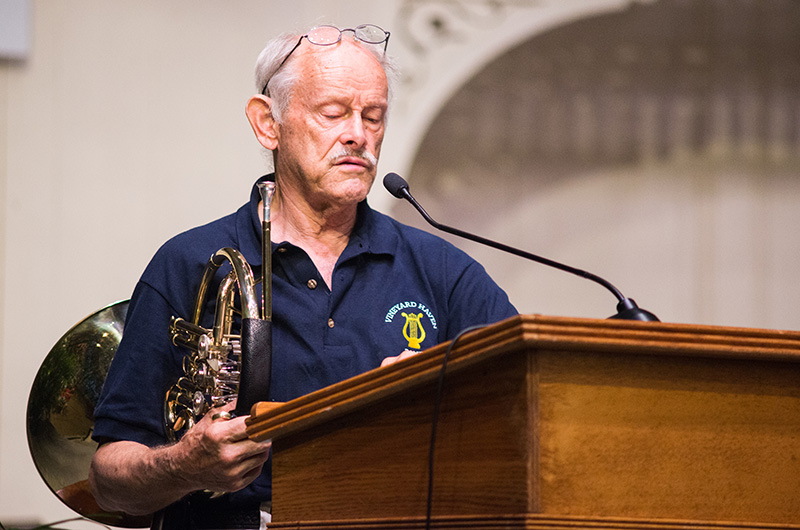Compared to the Vineyard Haven Band, the Rolling Stones are just getting started. Founded in 1868, the Island’s summer concert band held its 150th anniversary party August 9 with a gala performance at the Tabernacle in Oak Bluffs.
Nearly 40 musicians—from early teens to senior citizens, all in uniform polo shirts with band insignia— filled the stage where the band has performed on so many Grand Illumination and fireworks nights over the generations.
But this night was different, with former child actor (My Friend Flicka) and Vineyard resident John Washbrook narrating a lively program that celebrated the century and a half of American life that has unfolded since the Vineyard Haven band first played.
Tracing the concise, but illuminating program notes written by Hilary Danailova, Mr. Washbrook reminded the audience of the connections between world events and Vineyard life in various eras.

After Aaron Copland’s Fanfare for the Common Man, which opened the Tabernacle concert, Mr. Washbrook told listeners that the Vineyard steamship S.S. Naushon was taking troops to battle in World War II when Copland’s work was commissioned by the Cincinnati Symphony Orchestra in 1942.
The band then traveled back to the 1800s with John Philip Sousa’s rousing Semper Fidelis, which the Vineyard Haven Band of the late 19th century would have played for its audiences many times.
In a nod to their Tabernacle host, the Martha’s Vineyard Camp Meeting Association, the band played Just a Closer Walk with Thee. The 1869 gospel standard featured brief but elegant solos by three longtime members: clarinetist Hazel Allen, who has been with the Vineyard Haven Band for 16 years; trumpeter John Schilling, a 51-year member; and trombonist Jim Athearn, who joined the band 30 years ago.
Mr. Washbrook provided the voice of Abraham Lincoln in Lincoln at Gettysburg, set to a series of patriotic tunes arranged by the work’s composer Barry Kopetz. Lincoln’s famous address at the Gettysburg battlefield “inspired editorial staff at the Vineyard Gazette to champion freedom and voting rights for African-Americans,” according to Ms. Danailova’s program note.
After that solemn tribute, the musicians romped through the 1892 DeMolay Commandery March, by Maine composer R.B. Hall, which the Vineyard Haven Band of 1968 played in its 100th anniversary concert a half-century ago.
This fact is known not only because Ms. Allen possesses a recording of the 1968 concert, made on a plastic disc in the technology of the time, but because two current band members played in that concert 50 years ago: clarinetist Martha Child and trumpeter John Schilling.
During Lincoln at Gettysburg, Mr. Schilling played a cornet that was given to him after having been owned by at least two previous generations of Vineyard Haven Band trumpeters.
The band’s sound at the Tabernacle was rich and full and the playing precise, with conductor Julie Schilling keeping in close contact with every section—the seven clarinets, six flutes, four French horns and all the other woodwind, brass and percussion players.
Scott Joplin’s Maple Leaf Rag March was followed by Karl L. King’s medley of marches for Barnum & Bailey’s Circus, full of bouncing rhythms and ebullient melodies.
The infectious appeal of the music drew more audience members into the Tabernacle as the music continued into the night. By the time the band played St. Louis Blues, W.C. Handy’s foundational hit and one of the first “race” songs to become a pop number, the center section of the Tabernacle was well filled with an audience of all ages.
Limbered up by their work on St. Louis Blues, where they carried both the melody and the chorus in turn, the trombonists of the band got a white-hot spotlight in the 1923 vaudeville number Lassus Trombones. Its composer, Henry Fillmore, was known as the Father of the Smear—a Jazz Age term for trombone glissando—and he employed it liberally in what has become a Vineyard Haven Band standard.
Ms. Schilling recruited the audience to hi-de-hi-de-ho along with Cab Calloway’s 1931 Minnie the Moocher, a thrilling minor-key number full of big brass and drums.
Then it was on to 1950 with the Hoop-Dee-Doo Polka, which Ms. Danailova noted became a polka-dancing hit just around the time electrical service made its way to Gay Head (now Aquinnah).
Moon River—the increasingly nostalgic Henry Mancini hit from Breakfast at Tiffany’s—has long been one of the band’s standout songs, and for years it was owned by trumpet soloist Ed Rodgers. For this concert baritone horn player Dorian Lopes, a 21-year member, filled the solo role admirably with an understated, yet deeply felt performance, supported gorgeously by the band’s woodwinds and brass.
Moving from the sublime to the rib-tickling, the next number on the program was Curtain Call, a vaudeville-inspired number composed some five years ago by composer and conductor John Wasson. The band’s precision performance of this turn-on-a-dime piece, which jauntily compiles “everything including the kitchen sink” (in the composer’s words), had listeners shouting and cheering in delight.
The audience sang again, standing, when the band played the Star Spangled Banner. At first just a few voices were heard among the instruments; then more joined in, growing stronger till the finishing notes of the national anthem—“home of the brave.”
Amid massive applause, the bandmembers returned with Sousa’s Stars and Stripes Forever, their audience clapping proudly along.
After the concert, family and friends thronged the edge of the stage to greet and congratulate the musicians. A tent nearby held desserts and soft drinks for the after-party, where more mingling took place as children and grandchildren joined their elders.
The band will be back on stage Sunday in Ocean Park, Oak Bluffs; Wednesday at the Tabernacle on Illumination Night and Friday at the Tabernacle before the Oak Blufs fireworks. For more information, visit vineyardhavenband.com.








Comments (1)
Comments
Comment policy »